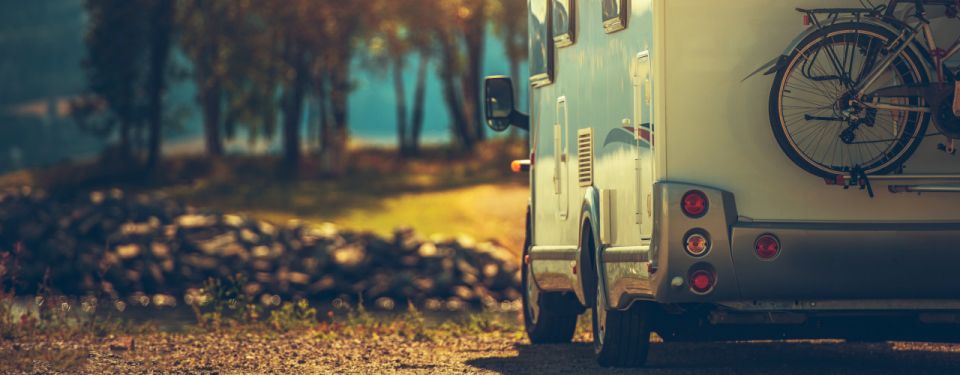
Are you planning to go on a trip with your camper or caravan? On this page we have put together some advice in order to help you to get to your destination safely.
In many cases, campers or caravans are only driven for a few weeks in year as part of a trip. Therefore, it is important to check the technical condition of the vehicle before a trip:
Equipment and general condition
- Check the general technical condition of the vehicle (oil level, wiper fluid, coolant, brakes, wipers, etc.).
- If your vehicle has a gas system, have it checked regularly and repaired if necessary. Gas hoses must be replaced regularly.
- Have the other technical equipment checked, including the refrigerator, the kitchen appliances and heating.
- Check the technical elements in the engine compartment for any damage.
- Carry all necessary on-board documents with you and check their validity. This also applies to any certifications of equipment.
Tires and rims
- The air pressure of the tires should be checked before departure and adjusted if necessary. Caution: Not every gas station has a system that is designed for the high pressure required in your vehicles tires.
- The police also advise that the tires of most campers or caravans should be changed after 5 years at the latest, as the chemical composition of the tires degrades over time and loses its adhesive power accordingly. This also applies if the vehicle isn't driven a lot.
- The load index of the tires (listed on the tires) and the rims (in the TÜV certificate) should be checked to avoid overloading.
Calculation of the load and speed index
Weight and charge
- Make sure that the maximum permissible charge of the vehicle is not exceeded. Often campers or caravans are already close to the maximum permissible charge without additional charges (luggage racks, equipment, luggage, etc.) and are therefore quickly overloaded during a journey.
- When buying or renting a caravan or camper, make sure that there is a certain margin between the mass without charge and the maximum permissible mass (both are listed in the registration certificate).
- If your camper or caravan has been converted to carry a heavier charge, this must be stated in the vehicle documents.
- Make sure that the type of driver's license matches the size and mass of the camper or caravan. To be able to drive it with a car driving license, the camper must not exceed the maximum permitted total mass of 3.5 tons.
- Make sure that all items in and on the vehicles (trailers, racks, luggage, equipment, etc.) are properly attached and secured. The same applies to the interior of the vehicles.
- Objects attached to the rear of the vehicle that overhang it by more than one meter must be marked with a red flag of at least 40 x 40 centimeters.
Driving with a camper or caravan
- If you are back behind the wheel of such a vehicle after a long break, familiarize yourself with its peculiarities before driving.
- Think about the larger dimensions of your caravan or camper, especially about protruding objects such as antennas, air conditioning or bicycle racks, etc.
- Pay attention to the effects of the charge on the vehicle's handling. This also affects the braking behavior and significantly increases the braking distance.
- Pay attention to drive at an appropriate speed in windy conditions.
Since 01.01.2021, the French road traffic regulations require that vehicles with a permissible total weight of over 3.5 tons (with the exception of agricultural and forestry vehicles, winter service vehicles and other emergency vehicles) must be marked on the sides and rear in French city centers with warning signs indicating danger areas due to blind spots.
Driving licence and trailer load
Up to a permissible total weight of 3,500 kilos, a category B car driving licence is sufficient.
With vehicles that correspond to category B, a trailer load with a maximum mass of 750 kilos may generally be towed.
However:
Vehicles that fall under category B may tow a trailer with a mass of more than 750 kilos if the total mass of trailer and vehicle does not exceed the maximum weight of 4,250 kilos. In this case, the driver must have attended and passed a special course. The course is certified with the so-called "Code 96" on the driving licence.
Example 1:
The maximum permissible total weight of a vehicle is 3,500 kilos. Accordingly, with a category B driving licence, a trailer load of 750 kilos may still be towed (3,500 + 750 = 4,250).
Explanation: Even with "Code 96", the maximum permissible weight of towing vehicle and camper is 4,250 kilos, which is why the trailer may only weigh 750 kilos.
Example 2:
The maximum permissible total weight of a vehicle is 2,750 kilos. Accordingly, with a category B driving licence, a trailer load of 750 kilos may still be towed (2,750 + 750 = 3,500).
However, since the maximum weight of towing vehicle and camper (maximum permissible weight 2,750 kilos) of 4,250 kilos is not reached, the trailer may exceed the maximum mass of 750 kilos on condition that the driver's licence contains the "Code 96". Accordingly, in this case a trailer with a total mass of 1,500 kilos may be towed (2,750 + 1,500 = 4,250).
Preventive check-ups offered by the Police:
Every year, owners of caravans and campers can have their vehicles checked by the traffic Police (UPR) in Bartringen as part of a road safety measure.
With this free service, the Police wants to make camper and caravan owners aware of the dangers of an overloaded vehicle and provide important tips and information on the correct weight of their camper, the securing of the load, the tire loading and further explanations on vehicle documents.
The checks usually take place before the start of the summer holidays.

